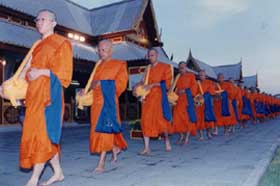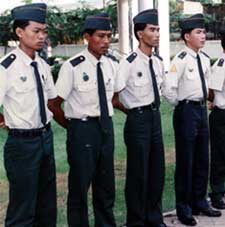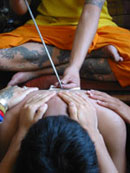Status
When I first moved to Thailand and began roaming my neighbourhood, I found a small store ten minutes away that carried all of those little emergency items like bread, milk, and eggs. I headed inside. The storeowner figured out I spoke English and took out the English grammar exercizes she had been working on for the last few months and asked me to correct them. No problem. She took 30 baht (75 cents) off of my bill for my services and then we started chatting.
She was armed with a list of questions. We did the standard-issue questions concerning name, nationality, marital status, and age. The next batch was more interesting. How much rent did I pay? How much money per month did my husband make? How much money did I make? What brand of car did I drive? How many cars did I have? Which exact house did I live in? What was in the bag I was carrying? Where did I buy it? How much did I pay for it?
I was totally shocked. I skirted the questions I did not want to answer, told her what was in the bag, what brand of car I owned, and where I lived. She seemed to like my answers and asked for my phone number. Then I went home and scratched my head. Where I come from you just don’t ask about annual incomes and mortgage payments on the first date. What did that all mean? Was she just rude?
what was in the bag, what brand of car I owned, and where I lived. She seemed to like my answers and asked for my phone number. Then I went home and scratched my head. Where I come from you just don’t ask about annual incomes and mortgage payments on the first date. What did that all mean? Was she just rude?
I ran the story by a few people and got the answer. This chat was all about status and status is really important in Thailand. I have hung out with truck drivers, daughters of multi-national corporation owners, farmers, mechanics, CEOs, and even unknowingly had a drink with a real European Princess once. I always thought friendship was based upon liking each other, sharing some mutual interests, having a mental connection, and thinking the other person was simply a good person. I have since learned that in Thailand the rules change. It’s not always about who you are. It’s more often about status.
Status is generally based on your outward appearance, your age, your job, your position within your company, your education, your family background, and your social connections.
job, your position within your company, your education, your family background, and your social connections.
Status and rank is so obvious to Thais that they do not give it a second thought. Paying attention to it is natural. Everyone is aware of and totally accepts the pecking order.
Everyone has a ‘Pi’ (pronounced like the letter P) which means older brother or sister and everyone has a ‘Nong’ which means younger brother or sister. This relationship applies to everyone you know and not just members of your family. It is polite when speaking to each other to use these titles. For example, “Hello Pi Robert” instead of just “Hello Robert” is the correct version.
If you are one day older than someone else, you are generally considered his or her ‘Pi.’ Being the older sister or brother means you have to take care of your ‘Nong’. Being the younger, or the ‘Nong’, you must obey, serve, and respect your elder. It is important to know who your ‘Pi’ and ‘Nong’ are and act accordingly.
act accordingly.
And it’s not always about age. If someone is of higher social status, you would automatically call them Pi or “Tan” which is a better indicator of a person’s higher social status.
When a group of monks make their morning alms walk, the monk with the highest rank and age is at the front of the line while the youngest is at the end. If you are Thai and are in a restaurant with a waitress, a chef, fifteen customers, and the owner, everyone in the room somehow knows where they stand. This relationship is not always clear to foreigners visiting Thailand but it is important to put some effort into figuring it out so you can avoid major social blunders.
With rank and status come uniforms. Many school children, university students, office workers, security guards, cashiers, and saleswomen, to name but a few, have uniforms and seem to enjoy wearing them. Back in the West we tend to like to flaunt our individuality. Here people generally like to flaunt their place.
Status can also be determined by a last name. We know names like Kennedy and Rockefeller. Thais pay a lot of attention to last names as a way to determine who is who and what their rank is.
Status determines how you greet someone, who you interact with on a social level, and how much respect he or she is given. It also leads to massive consumerism and buying on credit in an attempt to look wealthier than you actually are.
I really like my garbage men but I know it would make them uncomfortable if I attempted to befriend them. I think a smile, some kindness, and a tip go a long way in Thailand. The last time I went to visit the same shop owner she told me that I had gotten fat. Things are done and said differently in Thailand.
